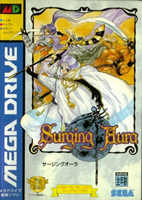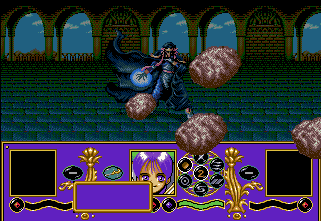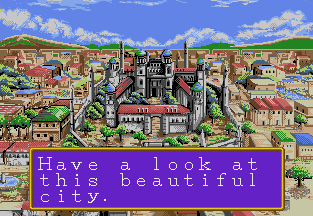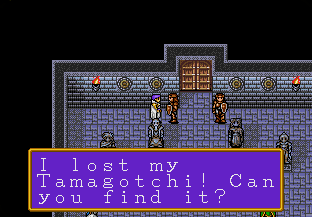 During the early ’90s, it seemed that for every great game that was released for the Genesis in the U.S., many more were left behind in Japan. Though it really wasn’t as many as we may remember (exactly how many were there? Read our feature Left in Japan: RPGs and see!), there were quite a few gems among those that never made it across the Pacific.
During the early ’90s, it seemed that for every great game that was released for the Genesis in the U.S., many more were left behind in Japan. Though it really wasn’t as many as we may remember (exactly how many were there? Read our feature Left in Japan: RPGs and see!), there were quite a few gems among those that never made it across the Pacific.
It was understandable then, that when Sega debuted Surging Aura, many fans were heartbroken to see it confined overseas. It featured an innovative battle system, great graphics, and what appeared to be an involving quest; but all petitions to Sega for a domestic release fell on deaf ears (as such petitions usually do). Thus, the game wallowed in import obscurity for almost a decade, until some devoted programmers took it upon themselves to attempt a translation that could at least be played through an emulator.
So Close, yet So Far Away…
I guess that perhaps the mystique and interest that Surging Aura may have inspired in its day have died down significantly in today’s gaming world, but I’m sure that there are many retro fans out there whose ears have perked up in dog-like fashion at the thought of being able to tackle this baby in English. A massive and intriguing title that used the same engine as Phantasy Star IV, Surging Aura had a lot going for it at the time, and was quite the temptation when previewed in magazines such as EGM and Mega Play. With characters designs by anime favorite Mutsumi Inomata, this appeared to be the next big gun in Sega’s RPG arsenal.
Beyond its obvious similarities to the Genesis’s flagship franchise, there were some interesting elements that stood out. For example, the battle system was set up so that only the main character could use magic. Everyone else in your party (you’re joined by several unlikely heroes, including a pirate) handled all the defending and distance attacks. Upon choosing a spell from one of six orbs, your MP bar began to build. The challenge came from knowing how to take out your foes in the best order. If you got careless, and an enemy attack might have just stunned you momentarily. Another hit however, would cancel out your spell entirely.
Even in Japanese, Surging Aura was pretty playable, but having to save the world from God-knows-who for God-knows-what-reason just didn’t sound as appealing as it should have. That’s why, in 1998, a group of fans over at the Sega retro site Eidolon’s Inn decided to try and translate the game into English.
An Aura that Faded all too Fast
 This wasn’t the first time someone decided to try and translate a Japanese Mega Drive game for an English-speaking audience. Several successful translations have already been completed, like Monster World IV and the recently-finished King Colossus Tougi Ou. Finally, through the power of emulation, these games can be played and appreciated by a whole new audience, and the knowledge gleaned from these time-consuming efforts serve as a solid base for future translations. You’d think that by now there would be tons of translations projects underway, right? Sadly, this is not the case. Bringing a Japanese game to the English vernacular is much harder than you’d think, especially when it involves one of the more text-heavy genres in gaming. Add to this the surprisingly low interest in localizing (so to speak) Mega Drive games and the relatively few people out there willing to make the effort, and things begin to look a bit bleak.
This wasn’t the first time someone decided to try and translate a Japanese Mega Drive game for an English-speaking audience. Several successful translations have already been completed, like Monster World IV and the recently-finished King Colossus Tougi Ou. Finally, through the power of emulation, these games can be played and appreciated by a whole new audience, and the knowledge gleaned from these time-consuming efforts serve as a solid base for future translations. You’d think that by now there would be tons of translations projects underway, right? Sadly, this is not the case. Bringing a Japanese game to the English vernacular is much harder than you’d think, especially when it involves one of the more text-heavy genres in gaming. Add to this the surprisingly low interest in localizing (so to speak) Mega Drive games and the relatively few people out there willing to make the effort, and things begin to look a bit bleak.
Whatever Happened to “Try, Try Again?”
Initial work on translating Surging Aura began in 1998, when Eidolon’s group began its first attempt at giving the game an English script. At first, it looked like a translation would be impossible, but closer inspection revealed that there was no reason why such an effort could not be done. Work began that year but soon stopped due to a bug in the script editor. It would take another year for the project to be approached again, and the loss of one of its translators in 1999 once again put it on the back burner. When a person finally stepped forward in December of 2000, there were still some hurdles to overcome. Surging Aura translator and gaming guru Steve Snake mentioned the problem in an email:
The translation has been sitting at where I left it. I have been looking for 3 people to help extract text from the game, send it to me, allow me to translate it, then send it back to be reinserted. That is the most time consuming part, extracting, copying, then reinserting. It would go a lot faster with that help, leaving me with time to translate and rewrite. I would handle it where I would start with what I have, send that to everyone helping me, then assign certain vectors to the three. I would translate each assignment sent back to me, one at a time, then update the rom, and send that out to everyone so they have the updated rom to work with. Then I would translate the next assignment, and update the rom again.. So on and so forth.
Obviously, one person doing the work of four was not the ideal situation. Thus, on January 2, 2000, Eidolon released all the tools he had programmed up until that point. While he still requested that any future patches be done through him, he was essentially giving the effort up to anyone willing to pick up where his group left off. A few examples (shown below) of what could be done were offered in hopes of motivating others, but his call ultimately went unanswered.
Hope for the Future?
Truthfully, things aren’t looking too good right now. No one has touched Surging Aura in over five years, and even the aforementioned Mega Drive successes have been unsuccessful in rousing interest. The tools are out there, waiting for someone valiant enough to finish what would undoubtedly be one of the biggest Mega Drive fan translations of all time. Until new blood steps forward and dusts off this ambitious undertaking, this incredible RPG will still be relegated to its native language. Hopefully, the recent release (and apparent success) of Super Fighter Team’s Beggar Prince will spark new enthusiasm for this sort of thing, and we may yet get to experience Surging Aura in English.



Recent Comments